
















Raising kids and caring for pets both come with their fair share of challenges -- and a whole lot of reward. Whether it’s teaching responsibility, building routines, or just figuring out what works best for your household, both can shape the rhythm of daily life in the best ways.

In this month’s Kids and Pets issue, we’re highlighting the people and programs making a difference to both. From an organization that steps in to support children during difficult times to expert tips on choosing the right pet for your family, we’ve gathered stories as well as advice you can use. You’ll also read about a creative regional literacy program that pairs young readers with dogs, and a longtime local youth initiative that gives kids hands-on experience with animals and leadership.
As always, we appreciate our amazing partners, and thank you, our readers, for inviting our magazine into your home. We’re grateful to shine a light on the connections that shape our community -- between children and pets, families and support systems, and the people who give their time and heart to help them thrive.
Warmly,
JAMES LISOWSKI, PUBLISHER @CITYLIFESTYLECHARLOTTESVILLE
August 2025
PUBLISHER
James Lisowski | james.lisowski@citylifestyle.com
EDITOR
Jennifer Waldera | jennifer.waldera@citylifestyle.com
CONTRIBUTING PHOTOGRAPHERS
Faith Fields, Allyson Henschel, Addison Kimble, Kat Larkin, James Lisowski, Karen Duncan Pape, Victoria Pavasko, Ali Haney - Brand & Market, Alisa Foytik/Pura Photo, Benevolent Photographer/ benevolentphotographer.com, CASA (National), Erin Gilmore Photography, HERD Ventures, Justin Ide Photography, Kids4Kids Gallery (via PCASA), Inn at Tabbs Creek, Piedmont CASA, Susan Kalergis Photography
CEO Steven Schowengerdt
COO Matthew Perry
CRO Jamie Pentz
VP OF OPERATIONS Janeane Thompson
VP OF SALES Andrew Leaders
AD DESIGNER Josh Govero
LAYOUT DESIGNER Amanda Schilling
QUALITY CONTROL SPECIALIST Marina Campbell





MURPHY
Associate Broker, GRI 434.466.5850 | griermurphy.com | griermurphy@nestrealty.com







Pets That Fit Your Family
Mill Creek Veterinary Clinic gives expert advice
Changing Lives, One Child at a Time
Piedmont CASA embraces its thirty
Children with Toby, a German Shorthaired Pointer, a rescue dog from Mid-Atlantic German Shorthaired Pointers ( www. mdgsprescue.org), and Dolly, a terrier mix available for adoption from Mae's Mutts Rescue ( www. maesmuttsrescue.org
How


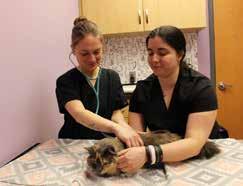
At Mill Creek Veterinary Clinic, our passion lies in delivering exceptional, ethical veterinary care for pets and their humans. We seamlessly blend top-tier medical knowledge and surgical expertise with low-stress techniques and a friendly, down-to-earth approach to solve your pet’s health concerns. From wellness to complex care, we’re here for all your pet’s needs. Let our compassionate team help you navigate the journey with confidence.

Quality, Care, & Craftsmanship
We are Proud Partners of TimberTech –The #1 Company in Premium Decking. TimberTech offers the beautiful look of real wood without the upkeep. With the largest color selection of all composite decking companies, we are able to collaborate on the best design for your project. Their industry leading technology offers a cooler touch and top-rated fire resistance. We partner with the best of the best to ensure your projects hold value for years to come. In fact, being a certified Silver Pro Contractor partner guarantees you receive their leading warranty for color fade, stain, and mold resistance as well as a manufactured defect warranty.
Serving Charlotteville, VA and surrounding areas, we provide top of the line carpentry services on custom decks, porches, repairs, remodeling, and general contracting Contact us for a consultation.
www.troupcustomcarpentry.com 434.328.0374
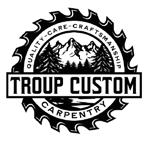









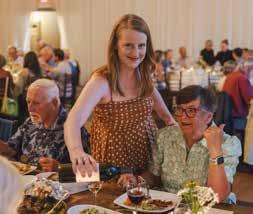






Throughout the year, Angelo Jewelry showcases the work of various local or regional artists in their shop on the Downtown Mall. In August, Karen Duncan Pape's work will be on display, and she describes the collection, saying, "Elegy is a loosely knit collection of very personal images that deal with loss, memory, and place. I often find that things seen aslant hint at a parallel world that I believe exists contemporaneous with observed reality." AngeloJewelry.com
Scan to read more
Looking for a refresh before the start of a new school year? Get your space in tiptop shape with the help of Charlottesville Organizing’s team of professionals, who can help you declutter, get ready for a move, or elevate your living space. CharlottesvilleOrganizing.com
With longer daylight hours, it's the perfect season to tackle both indoor and outdoor updates. Beat the fall rush and get your space in shape. Call Troup Custom Carpentry to secure your spot and bring your vision to life while summer is still in full swing. TroupCustomCarpentry.com. Scan to read more
MILL CREEK VETERINARY CLINIC GIVES EXPERT
ADVICE ON PICKING THE PERFECT PET.
ARTICLE BY JENNIFER WALDERA


WHAT SHOULD PARENTS CONSIDER WHEN CHOOSING A PET FOR THEIR FAMILY?
Parents should consider their lifestyle -- are you an active family who loves to hike and be outside? Or are you looking for a companion that does not require a large amount of exercise (more low-energy)? A high-energy dog may sound fun, but if no one’s home to walk it, it’s not fair to the pet or the kids.
Other questions to consider before thinking about the pet:
• How much time do we have for daily care, training, exercise, and attention?
• What’s our living situation? (Apartment, house, fenced yard)
• Are there allergies or fears to consider?
• What’s our budget for food, veterinary care, grooming, etc.?
• How old are the children, and do you often have visitors?
ARE THERE CERTAIN TYPES OF PETS YOU RECOMMEND FOR FAMILIES WITH YOUNG CHILDREN?
Focus on the temperament of the pet, not just the breed. Look for a friendly, stable temperament, especially in a home with children. You could consider rescue pets with a known history of being good with kids -- there are a lot of shelters that allow meet-and-greets with the whole family. Again, it depends on the lifestyle of the parent and the temperament/personality of the companion in question.
WHAT ARE SOME COMMON MISCONCEPTIONS OR MISTAKES YOU SEE FAMILIES MAKE WHEN PICKING A PET FOR THEIR KIDS?
Not necessarily when picking a pet, but when you actually have the pet, it is important to teach kids to respect pets and their boundaries. It is also important not to choose a pet just because of their breed (or trends), as every individual is different.
HOW CAN FAMILIES FIND A GOOD BALANCE BETWEEN A PET THAT’S FUN FOR THE KIDS AND ONE THAT FITS INTO THEIR LIFESTYLE?
That’s a great question, because choosing the right pet isn’t just about what’s cute or fun in the moment. It’s about creating a healthy, happy match between the family’s lifestyle and the pet’s needs, especially when kids are involved.
WHAT ARE SOME OF THE DEVELOPMENTAL BENEFITS YOU’VE SEEN WHEN KIDS TAKE PART IN PET CARE?
Young children can help feed or brush a calm dog or cat, learning how to respect their bodies and help to care for them. Teens may handle training or walking, learning how to handle a little more responsibility. It is important to avoid pets that require constant supervision with kids, like some exotic animals or fragile small rodents. Or, alternatively, make sure that children are always supervised when with small/exotic animals.
CAN PETS HELP KIDS BUILD EMOTIONAL INTELLIGENCE AND EMPATHY?
Yes, definitely! By teaching kids to respect all animals, you are teaching them how to recognize and understand their pet’s needs, which helps teach empathy.
WHAT ARE SOME TIPS FOR INTRODUCING A NEW PET TO A HOME WITH CHILDREN?
Take it slow and don’t rush it -- some pets take a little while to adjust, and that is okay. You take it at their pace; rushing the process will likely not have the outcome you would like. Patience is key. For shelter/ rescue dogs in particular, we use the 3/3/3 rule, meaning expecting at least 3 days to decompress, at least 3 days before learning a routine, and 3 months to fully acclimate to their environment. Do your research and prepare for the pet you are anticipating bringing into your home.
“By teaching kids to respect all animals, you are teaching them how to recognize and understand their pet’s needs, which helps teach empathy.”
“Choosing the right pet isn’t just about what’s cute or fun in the moment. It’s about creating a healthy, happy match between the family’s lifestyle and the pet’s needs...”

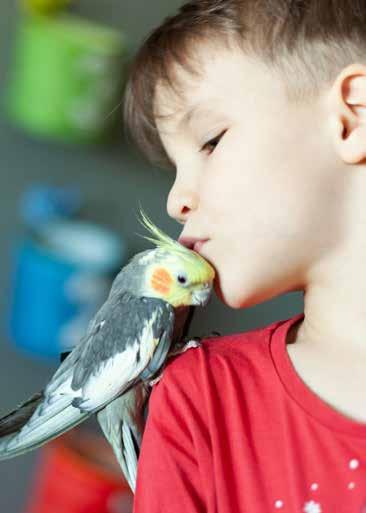





In 1976, the first Court Appointed Special Advocates (CASA) was founded with the purpose of training volunteers to support and represent children in foster care. Within several years’ time, the organization had spread across the United States, and in 1995, the Piedmont Court Appointed Special Advocates’ (PCASA) branch was established in Charlottesville, serving children within the city as well as in Albemarle County. Now, PCASA also serves Fluvanna, Greene, Louisa, and Madison.
“Our mission is to help children before the courts to find safe, loving, permanent homes and have the opportunity to thrive in those homes,” said Kate Duvall, President and CEO of PCASA. “We carry out our mission by working with volunteers in the community who serve as advocates.”
When PCASA first began its work in Charlotteville, it had only two volunteers who were serving two children. In the 30 years since, it has supported over 2500 children and trained over 900 volunteers who are at the heart of the program.
“Our volunteers are from all walks of life, all throughout our service area. They get to know the child and every adult involved in their life and have access to medical, mental health, and school records for a full picture of the child and who they are as an
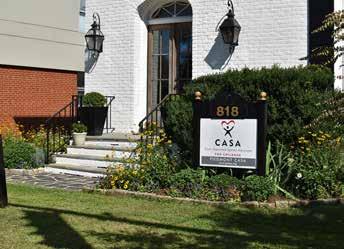
Piedmont CASA embraces its thirty years of advocacy, compassion, and unwavering community commitment.
ARTICLE BY JENNIFER WALDERA PHOTOGRAPHY BY CONTRIBUTING PHOTOGRAPHERS

individual,” Duvall said. “Then they share that report in court with the judge so the judge can make a really informed decision. It’s very in-depth and involved, and it’s an incredibly impactful volunteer role.”
As an independent non-profit, PCASA has the unique ability to hone in and truly focus on the best interests of children assigned to them. Volunteers focus on one child or sibling group (up to three children) at a time, advocating throughout the life of a case. And while other professionals and individuals involved in these types of cases may change over time, PCASA volunteers remain the one constant adult in that child’s life over many months or even years.
“We had a court-appointed special advocate who worked with a child who came into care and remained in care for four years. The child was in at least four different foster care places and had five different social workers,” Duvall said. “There were a lot of adults in that child’s life -- the one consistent person was the court-appointed special advocate. They were able to get to know the child, identify educational and medical needs, and advocate for those needs to be met. And, advocacy is not limited to the courtroom -- it’s also in the community for different services.”
As PCASA approaches its 30th anniversary, it intends to celebrate in-house and potentially in the community as well. But it is also increasing its efforts to recruit and train volunteers, and encourage community involvement as the need for services increases throughout the region. To learn more about volunteering, donating, or PCASA’s annual fundraiser, Mustaches 4 Kids, visit PCASA.org . “This is work that is hugely important,” Duvall said. “PCASA volunteers are making significant differences in children’s lives.”

Our mission is to help children before the courts to find safe, loving, permanent homes and have the opportunity to thrive in those homes... by working with volunteers in the community who serve as advocates.














ARTICLE BY JENNIFER WALDERA
CAN YOU SHARE A BRIEF OVERVIEW OF THE PAWS TO READ PROGRAM AND HOW IT GOT STARTED AT JMRL?
Paws to Read is a partnership between Jefferson-Madison Regional Library and local therapy dogs and their humans to create an environment that invites growing readers to practice their reading skills in a welcoming, non-judgmental setting. The individual partnerships between therapy dogs and the library usually begin when a therapy dog’s human reaches out, interested in volunteering at the library, or when a community member makes an introduction between a library staff member and a therapy dog.
HOW FURRY FRIENDS HELP KIDS FALL IN LOVE WITH READING AT JEFFERSON-MADISON

“OVER THE COURSE OF JUST
WHAT INSPIRED THE LIBRARY TO OFFER A PROGRAM THAT PAIRS CHILDREN WITH DOGS FOR READING TIME?
One of the goals of early literacy programming at the library is to instill a lifelong love of reading in children, and one great way to do that is to make reading exciting and fun for kids. Introducing the element of being able to read to and interact with a friendly dog encourages kids to visit the library, select a book to read, and read aloud, all for the pleasure of reading. A 2023 study showed that reading to a dog improved children’s attitudes toward reading (Coffman, et al.,2023). Positive attitudes toward reading have been shown to predict reading skills and achievement (Froiland & Oros, 2014). A 2022 study also showed improvements in reading performance for 7- and 8-year olds after canine-assisted reading support sessions (Syrnyk, et al. 2022).
HOW OFTEN IS THE PAWS TO READ PROGRAM OFFERED, AND AT WHICH BRANCHES?
Currently, Paws to Read is offered regularly at Crozet, Gordon Avenue, Louisa, Nelson, and Northside, based on the availability of the therapy dogs and library staff. All JMRL branches are able to host Paws to Read programs, so therapy dogs and their humans who are interested in volunteering can reach out to Megan Smead, JMRL’s Children’s Services Manager, at msmead@jmrl.org.
DO FAMILIES NEED TO REGISTER IN ADVANCE, OR CAN THEY DROP IN?
Registration is required in advance by calling the library branch. You can find out more by searching “Paws” in JMRL’s online calendar at jmrl.org/calendar.
HOW ARE THE READING SESSIONS STRUCTURED -HOW LONG ARE THEY, AND HOW MANY CHILDREN CAN PARTICIPATE AT ONE TIME?
Paws to Read sessions are typically 15 minutes long, and one child reads to one dog. The session time is long enough for a child to practice their reading skills, and short enough to allow for multiple readers to participate in back-to-back sessions without tiring the therapy dog. These sessions are one-on-one, so the child doesn’t feel any pressure or judgment from peers about their reading choices or skills.
CONTINUED >



Megan Smead had a few more words to share about Paws to Read:
• The goals of Paws to Read are to instill a love of reading, provide an opportunity to develop reading skills, and establish a foundation for literacy that will support a reader throughout their life.
• The community response to Paws to Read has been overwhelmingly positive. Sessions fill up quickly, and many participants come back for more sessions after their first experience. The library receives positive feedback from participants and volunteers about the program.
• Parents have provided positive feedback about the program, with one mom telling library staff, "That was awesome! We are coming back next week!"
• JMRL is always looking for therapy dogs and their humans to provide additional sessions. Offering more sessions depends on their availability and generous donations of their time.
• Anyone who is interested in supporting Paws to Read can contact Megan Smead at msmead@jmrl.org.
ARE THE DOGS PART OF A THERAPY ANIMAL PROGRAM OR A SPECIFIC ORGANIZATION YOU PARTNER WITH?
JMRL has partnered with a variety of therapy dog organizations, including Green Dogs Unleashed, Therapy Dogs International, and Alliance Therapy Dogs.
WHAT KIND OF TRAINING OR CERTIFICATION DO THE DOGS AND THEIR HANDLERS HAVE?
Both therapy dogs and their humans have required training classes through their therapy dog organizations, as well as facility visit observations that lead to certification.
WHAT KINDS OF CHANGES OR GROWTH HAVE YOU OBSERVED IN CHILDREN WHO PARTICIPATE IN THE PROGRAM?
Over the course of just one session, library staff have observed children relax and appear more confident and enthusiastic about reading aloud. The library does not monitor or track children in the program, but clearly, children and their parents are finding benefits to the program, as the programs are usually full, and there are many repeat participants.
ARE THERE AGE RANGES OR READING LEVELS THAT BENEFIT MOST FROM THIS KIND OF PROGRAM?
Any reader can benefit from Paws to Read! An article from the National Institute of Health notes that “Interacting with animals has been shown to decrease levels of cortisol (a stress-related hormone) and lower blood pressure. Other studies have found that animals can reduce loneliness, increase feelings of social support, and boost your mood.” Not only does Paws to Read provide an opportunity to practice reading skills, but it can also potentially benefit readers’ mood and health!
WHAT OTHER CREATIVE OR UNCONVENTIONAL LITERACY PROGRAMS DOES THE LIBRARY OFFER FOR KIDS?
The library offers a wide range of literacy programs for children, with a variety of creative approaches. Book clubs may sound traditional, but library staff put a special spin on some of these discussion groups, including a group where caregivers and kids read a graphic novel together and discuss it over a craft project, and a group where kids get together to read the first chapter of a book together, discuss it, and then take a free copy home to finish the book. There are so many wonderful programs led by JMRL’s creative, thoughtful, enthusiastic staff, and anyone interested in learning more can visit jmrl.org/calendar to view the full schedule of events.















Practical skills, powerful lessons on leadership, and a whole lot of heart
ARTICLE BY JENNIFER WALDERA PHOTOGRAPHY BY CONTRIBUTING PHOTOGRAPHERS
Established in the early 1900s, Albemarle/Charlottesville 4-H’s programming initially focused on home economics and agriculture, later expanding with an added emphasis on youth contests, livestock, crops, and schoolbased learning. Supported by the Virginia Cooperative Extension (VCE), a statewide educational outreach program through Virginia Tech and Virginia State University, the organization now offers an extensive selection of hands-on informal learning experiences that promote leadership and citizenship while teaching life skills.
“Our work spans urban and rural communities, and our mission is to empower youth to become confident, capable, and compassionate citizens through realworld experiences,” said Sarah Brown, 4-H Education and Outreach Facilitator. “We empower youth to lead, we’re deeply rooted in our community’s traditions and values, and we’re constantly evolving to meet the needs and dreams of tomorrow’s leaders.”
Led by Brown and Extension Agent Sam Leech, Albemarle/Charlottesville 4-H offers everything from traditional livestock projects to STEM, art, and civic engagement programs, all with an eye on building resilience and confidence. “In 4-H, youth first build the confidence to try new things, and with time and support, many become true masters in their chosen areas,” Brown said. “Parents often share how this newfound confidence inspires young people to take on exciting opportunities, whether competing in state horse shows, participating in national ARBA rabbit competitions, or boldly stepping up to lead a bluegrass jam session with strangers.”

Participants in the 4-H programs are also able to develop other skills that will last a lifetime. “Here, youth don’t just learn about leadership, they live it. They don’t just study science or agriculture -- they apply those skills to real-world challenges, working side by side with caring adult mentors who guide and inspire their growth every step of the way.”
For Albemarle/Charlottesville 4-H, volunteers are at the center of everything that the organization provides in roles that range from club leaders and event organizers to mentors and role models. “Here in the Charlottesville area, we are incredibly fortunate to have dedicated volunteers who believe deeply in our mission, Brown said. “Our programs simply wouldn’t be possible without their support and commitment.”
Albemarle/Charlottesville 4-H also interacts with the community in a multitude of ways. It has formed partnerships with Camp Albemarle, James Monroe’s Highland, Ivy Creek Foundation, Habitat for Humanity, area schools, churches, farms, and nonprofits, all with the purpose of providing learning experiences that are both hands-on and meaningful. The work of
CONTINUED >
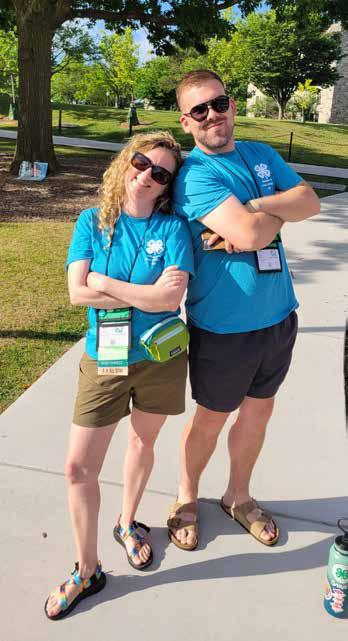
Top
Mid

“We empower youth to lead, we’re deeply rooted in our community’s traditions and values, and we’re constantly evolving to meet the needs and dreams of tomorrow’s leaders.”


4-H participants can also be spotted at numerous local events, including the Grace Church Historic Farm Tour, the Albemarle County Fair, Fall Foxfield Races, and agricultural education days at Charlottesville High School. Additionally, youth involved with the organization participate in volunteer activities throughout the area. “Our youth are actively engaged in service projects, community cleanups, and civic outreach efforts, such as planting trees with the Rivanna Conservation Alliance, sewing cage comforters for the CASPCA, and sewing pillowcases for the Shelter for Help in Emergency,” Brown said. “Our clubs have also prepared meals for PACEM.”
While the local 4-H has been operating for over a century, it is continuously expanding. Brown says that it has established a new Albemarle/Charlottesville 4-H Livestock Leadership Association that teaches youth production livestock skills and practices that can be useful within the industry as well as in other facets of their lives. It has also added a new Nature Project Group in the Western Albemarle Community Club that works with a Rivanna Master Naturalist to deliver educational content on ecosystems and the environment. In terms of future initiatives, the organization’s leaders hope to expand access to underserved communities, increase opportunities in emerging areas like agri-tech and civic innovation, and create a permanent facility that will be a hub for youth leadership, agriculture, and community education.
From helping youth acquire practical skills to building confidence and knowledge in a hands-on environment, Albemarle/Charlottesville 4-H offers broad benefits for members. But Brown believes that powerful connections are at the heart of what makes the organization special. “What truly sets our Albemarle/Charlottesville 4-H program apart is the deep, lasting relationships we cultivate,” she said. “We believe in the power of every young person, regardless of their background.”
Those interested in learning more about programs, camps, and clubs can reach out to the Albemarle Cooperative Extension Office or visit the website, bit.ly/Albemarle4H. Community members can also volunteer their time, host events, sponsor awards or supplies, or spread the word about what 4-H offers.









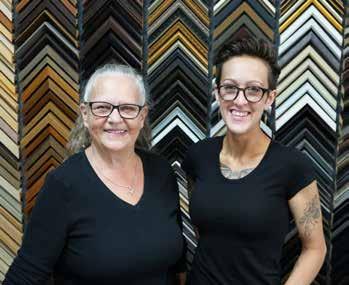

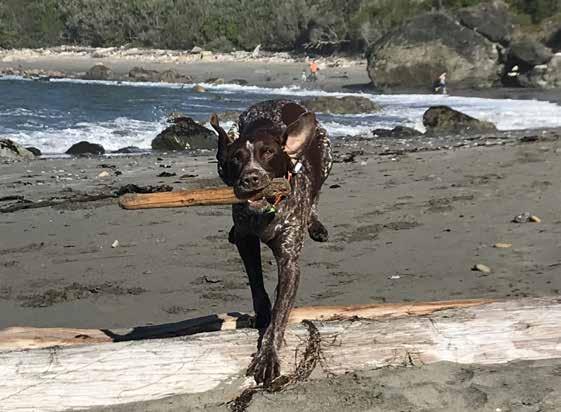
MID-ATLANTIC GERMAN SHORTHAIRED POINTER RESCUE: POWERED BY PASSION AND COMPASSION
ARTICLE BY JENNIFER WALDERA
PHOTOGRAPHY BY FAITH FIELDS AND JAMES LISOWSKI


Since 2001, Mid-Atlantic GSP Rescue has been dedicated to saving German Shorthaired Pointers in need across Virginia, Maryland, Delaware, and West Virginia. A small but passionate group of about 25 volunteers makes it all happen, rescuing, fostering, and rehoming around 100 dogs each year.
“We assume GSPs into our care via shelters or owners contacting us,” said Faith Fields, President of the Board of Mid-Atlantic GSP Rescue. “We foster to get to know the dog, provide all needed vetting, and determine what would be an adequate permanent home for the dog.” From routine checkups to ACL surgeries, heartworm treatments, and mending broken legs, every dog gets the care it needs, no matter the cost.
Foster homes are the heart of the rescue. Mid-Atlantic GSP covers all medical expenses, preventatives, and even food when needed, so fosters can focus on giving love and stability to dogs in transition.
Because adoption fees rarely cover total expenses, the non-profit relies on fundraisers like its annual calendar contest and ongoing GSP gear sales to help keep its mission going strong.
Each dog in the program is spayed or neutered before adoption. “Every dog in our program is altered as we would love utopia where there was not an over pet population and dogs were not euthanized on a daily basis at shelters,” Field said.
The organization is always looking for new volunteers, fosters, donors, and supporters. Whether you have time, resources, or simply a love for the breed, there’s a way to get involved. Visit mdgsprescue.org to get involved.
For more regional spots to seek out fostering or adoption opportunities for various breeds, see CASPCA.org, GreenDogsUnleashed.org, or MaesMuttsRescue.org.

ARTICLE BY JENNIFER WALDERA PHOTOGRAPHY BY CONTRIBUTING PHOTOGRAPHERS
This tucked-away waterfront town offers all you need for a peaceful, picturesque getaway.
Located on Virginia’s Middle Peninsula along the Chesapeake Bay, Mathews is a destination that flies under the radar. But for those in the know, it’s a favorite for relaxed, low-key getaways that are far closer than traveling to the oceanic coast. Whether you're planning a weekend with friends, a family trip, or a couple’s escape, Mathews offers the right mix of scenic spots, casual outdoor adventure, and locally rooted experiences.

You won’t find big hotels here, but you will find plenty of charm and character.
The Inn at Tabbs Creek is a locally owned bed and breakfast set on the water, offering newly renovated rooms with a relaxed coastal feel, a private dock, saltwater heated pool, and access to kayaks, bikes, and fishing poles. Suites offer amenities that range from heated bathroom floors and rain showerheads to private patios or grills. It’s perfect for couples or small groups looking for a peaceful place to unwind.
Vacation rentals are also a popular option, especially for families or larger groups. Many homes are just steps from the water, with porches, fire pits, and enough space to make yourself at home. Whether you’re looking for a renovated farmhouse, a cottage with water views, or something right on the beach, there are plenty of options in and around Mathews.
Mathews’ dining scene is primarily casual but well-crafted, often with an emphasis on fresh, local ingredients.
Richardson’s Cafe is a go-to for families or anyone craving a reliable spot for lunch or dinner. Burgers, sandwiches, salads, and classic milkshakes are served in a restored 1930s pharmacy. Hole in the Wall Waterfront Grill is another laid-back option, though this one offers sprawling views of the water from both inside the restaurant and from its deck. The menu offers an array of salads, sandwiches, burgers, tacos, and entrees with plenty of seafood that’s perfect for waterside dining.
The White Dog Bistro is one of the more elevated options in town. It’s ideal for a date night or group dinner. Housed in an historic mansion, the restaurant features seasonal, upscale coastal fare like shrimp, scallops, and fish as well as steaks, all in a setting that’s comfortably refined. For a relaxed tasting experience, head to Zoll Vineyards , a local winery producing a variety of wines, ciders, and meads. The tasting room is friendly and low-key, and there are plenty of snacks and entrees for pairing.

“MATHEWS
IS SURROUNDED BY WATER, SO MANY OF ITS OUTDOOR OFFERINGS REVOLVE AROUND THE BAY. MEANWHILE, IT'S ALSO EASY TO SPEND A DAY DOING NOTHING MORE THAN SITTING BY THE WATER WITH A BOOK, A GLASS OF WINE, OR A FISHING ROD
IN HAND.”


Mathews is surrounded by water, so many of its outdoor offerings revolve around the bay.
Haven Beach is an easily accessible beach spot with a small parking area and calm waters. It’s a solid pick for families with kids or anyone looking for a simple beach day without the crowds.
Bethel Beach Natural Area Preserve is a quiet, undeveloped beach perfect for walking, birdwatching, or a low-key afternoon picnic. There are no amenities, but that’s part of its appeal -- it feels remote, even though it’s just a short drive from town.
For those who like to be on the water, kayaking is a great way to explore the area. A popular route is paddling to and from New Point Comfort Lighthouse , the third oldest lighthouse on the Chesapeake Bay. It sits just offshore and offers expansive views from the water, especially around sunset. Rentals and launch areas are available.
For golf enthusiasts, Piankatank River Golf Club is about a 25-minute drive away. A portion of the course runs along the river and offers scenic views without the high price tag.
Meanwhile, it's also easy to spend a day doing nothing more than sitting by the water with a book, a glass of wine, or a fishing rod in hand.
Downtown Mathews is compact but full of character. Shops here are primarily locally owned and perfect for browsing.
If secondhand finds are what you’re looking for, there are plenty of options for perusing. Pop into shops like Doodlebugs , Roane’s Antiques , Rise as

One Thrift , or The Vintage Pearl . Or, seek out gifts, books, art supplies, clothing, and more at any of the other shops in town.
If you’re visiting on a Saturday (April through October), stop by the Mathews Farmers Market . It’s a small but lively event with local produce, baked goods, handmade crafts, and live entertainment.
For history buffs, there are several spots to stop into during a trip to Mathews.
Historic Main Street itself is worth a slow stroll, and Mathews Museum is a stop along the way that offers a deeper look into the county’s past. Or, take a short drive north and visit Gwynn’s Island Museum to get another glimpse of the area’s rich history.
Finally, art lovers will appreciate the numerous galleries and studios, and music lovers can enjoy concerts on select dates at Music on Maple .
AUGUST 1ST
Barboursville Vineyards, 17655 Winery Rd, Barboursville, VA 22923 | 7:00 PM
Barboursville Vineyard and Village Garden Farm will team up to provide a four-course wine-paired meal on August 1. From soup and gnocchi to beef and panna cotta, each of Executive Chef Michael Clough’s dishes will prominently feature Village Garden Farm’s tomatoes. For reservations, visit BBVWine.com.
AUGUST 7TH
Keswick Hall, 701 Club Dr, Keswick, VA 22947 | 11:00 AM
Keswick Hall is proud to be the home of the Southern Living 2025 Idea House and will be unveiling its exquisite style and design to the public for the first time on August 6. The event will include a first look tour, breakfast or lunch at Marigold Jean-Georges, a VIP gift bag, and a meeting with the makers. For tickets, visit SLIdeaHouseEvent.com.
AUGUST 9TH
Veritas Vineyards and Winery, 151 Veritas Ln, Afton, VA 22920 | 5:30 PM
Visit Veritas Vineyard and Winery for a night of music, wine, and dining. On August 9, the winery will welcome Applebutter Soul, who will perform a wide range of music from Motown, funk, and jazz to R&B, soul, and Top 40 tunes. For details and tickets, see VeritasWines.com
AUGUST 10TH
Indigo House in Crozet | 10:00 AM
Join Leni Sorensen at Indigo House for this five-hour-long hands-on class that covers both water bath canning and pressure canning, as well as a bit of food history. The class also includes a light lunch. To reserve your space, visit IndigoHouse.us. Directions will be provided after reservations are made.
AUGUST 22ND - 24TH
Oak Grove Folk Music Festival
Oak Grove Theater 845 Quick’s Mill Rd, Staunton, VA 24401
The Oak Grove Theater in Staunton will host the 47th annual Oak Grove Folk Music Festival. For three days, attendees can enjoy concerts, jamming, and an open mic event. For more information and to purchase tickets, visit OakGroveTheater.org
AUGUST 30TH - 31ST
1000 W Main St, Charlottesville, VA 22903
Throughout the weekend of August 30th–31st, pūrvelo will be celebrating its 10th anniversary with giveaways, special edition merch, and opportunities to cycle with the team. Additionally, as a thank-you to the community and to celebrate the milestone, pūrvelo is inviting Charlottesville City Lifestyle readers to ride with them for free anytime in the month of August. Readers can apply promo code 10YEARSOFPUR to redeem 100% off a Single Class ($28 value).
ARTICLE BY BETH DEL VILLE | PHOTOGRAPHY BY QIANA KELSCH
AN EASY AND HEARTWARMING WAY TO GIVE BACK WITH YOUR KIDS WHILE HELPING TO BRIGHTEN SOMEONE’S SPECIAL DAY
Looking for a fun, easy and creative way to help those in need celebrate their special day? Put together a Birthday in a Box! The main element is a birthday cake, and the best part is that no perishable items are needed; all you need is one can of lemon-lime soda to take the place of the oil, water and eggs.
Collect all materials. Makes one Birthday in a Box.
• 1 Box of cake mix
• 1 Container of frosting
• 1 Can of lemon-lime soda
• 1 Disposable 9x13 aluminum baking pan with lid
• Cardstock or heavy paper, for baking directions and note (printed or handwritten)
• Party decorations of choice, including candles
Gather cake mix, container of frosting, can of lemon-lime soda, aluminum baking pan with lid and party decorations. Carefully place each item in the bottom of the baking pan, ensuring everything fits snugly.
Print or handwrite the instructions on cardstock, letting the recipient know to replace the oil, eggs and water with the can of lemon-lime soda, following the directions on the back of the cake mix box. You can also include a birthday wish.
Once all the items are in the pan, secure the lid and tie the package with a ribbon for an added festive touch. Deliver to your favorite food pantry.
And what is a birthday celebration without decorations? Get the kids to help decide what fun party decorations to include –think candles, banners, confetti, ribbon and more.
These are great to make in batches when items are on sale at the grocery store. Stock up and make someone’s day!
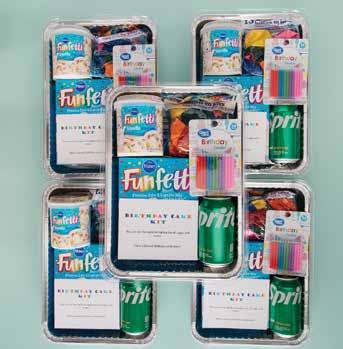
Collect your essentials and special decorations
Place each element in the baking pan, including directions, and cover with the lid
Collect your birthday cake boxes together and drop it at your favorite food pantry

ADDITIONAL ITEMS TO CONSIDER: Include candles; balloons; a birthday banner; noisemakers; a blank card for friends and family to sign; a small, gender-neutral gift or a gift card; birthday-themed paper plates and napkins. You don’t have to make each box the same – choose a different cake mix and frosting flavor for each box!
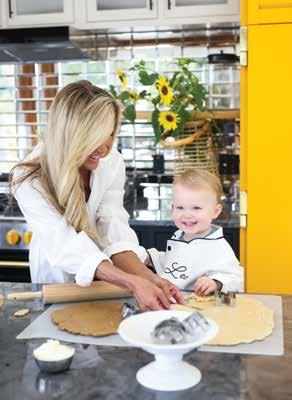

• 1 cup and 2 tbsp white flour
• 1/4 tsp baking soda
• 1/2 cup oatmeal
• 4 tbsp honey
• 1/2 tsp vanilla
BY JANIE JONES
There’s something truly special about inviting your child into the kitchen—not just for the cookies or cupcakes, but for the confidence, creativity, and connection that come with it. Cooking with your children isn’t just a fun way to pass the time; it’s an opportunity to build lifelong skills and memories that stick.
Cooking together also taps into something a little magical—memory. The smell of cookies baking or chili simmering on the stove can instantly transport us back to childhood. That’s not just nostalgia talking—science backs it up. Our sense of smell is closely tied to autobiographical memory, especially memories formed early in life. So those sweet, savory scents? They’re more powerful than you might think.
The key is to start simple. Let your toddler play with mixing bowls, spoons, and measuring cups. Begin with small jobs—scooping flour, flattening cookie dough with a rolling pin—and gradually add more steps as your child becomes more confident.
It won’t be perfect. Embrace the mess, stay patient, and focus on the fun. A dash of encouragement and a sprinkle of praise go a long way in keeping your little chef engaged and excited.
Over time, you’ll see the magic unfold: a child who’s not only learning how to cook but also growing more independent, capable, and proud of what they’ve created. And who knows? Maybe one day, they’ll pass those same recipes—and memories—on to their own kids.

• 4 tbsp buttermilk
• 1/2 tsp almond extract
• 1/4 tsp salt
• 1/4 cup whole wheat flour
• 1/4 cup unsalted butter, room temperature
• Optional: add 1/4 tsp nutmeg or cinnamon
1. Preheat the oven to 400 degrees.
2. Put the oatmeal in a blender or food processor and pulse for about a minute, until it’s reduced to a rough powder. Add the ground oatmeal to the whole wheat and 1/2 cup of the white flour, baking soda and salt to the bowl of an electric mixer affixed with a paddle attachment, and turn on to mix. Add butter and blend on medium speed until the butter has been incorporated and the mix looks a little like wet sand. Add the buttermilk, vanilla, honey and almond extract and blend. If the dough looks too wet to roll, add the remaining flour 1/4 cup at a time until the dough forms a ball and pulls away from the sides of the blender.
3. Turn the dough out onto a piece of plastic wrap and flatten into a disc. Cover completely and chill in the fridge for at least one hour, up to overnight.
4. When ready to bake, preheat the oven to 400 degrees and place dough on a lightly floured surface (using the remaining 2 tbsp of flour). Roll out until 1/8 inch thick. Cut out with desired cookie cutters and bake for five to seven minutes, based on your preference. Five minutes will get you a softer cracker, while seven will get you a crisp cracker.
Enjoy!












